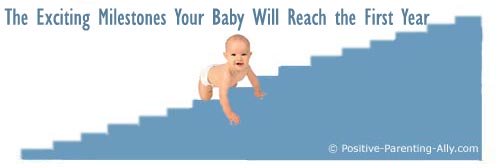
In-Depth List of All the Baby Milestones Reached the First Year
Get deep insights into all the fantastic baby milestones your
baby will literally race through during the first year (if we parents could just
learn at a fraction of that speed, imagine the possibilities!! :-).
This all-inclusive guide on early child development will
take you though each month of the baby development stages
and reveal fascinating, well-researched and useful facts and
information about your baby's physical, cognitive & psychological
and social & emotional milestones.
Get tailor suited,
high-level love based parenting tips along the way that
will aim at mentally empowering you and physically, emotionally and
socially empowering your baby.
If you wish to
understand the big picture of early child development I
recommend that you get comfortable, lean back and grab a cop of
coffee (or perhaps tee, if you prefer that) and just continue
reading this article chronologically.
If on the other
hand, you are in a more goal orientated mood and need to
find some concrete infant milestones concerning a specific month,
you may jump directly to them via these links:
- Milestones for the 1st and 2nd Month
- Milestones for the 3rd Month
- Milestones for the 4th Month
- Milestones for the 5th Month
- Milestones for the 6th Month
- Milestones for the 7th and 8th Month
- Milestones for the 9th, 10th, 11th and 12th Month
Your Chosen State of Consciousness for Your Baby's Journey
As
you have probably already noticed (or will no doubt notice very
soon) the first year of your baby's life is a growing and learning
experience not only for your baby, but for you, too!
You are
taught the exquisite art of incredible patience, growing expanded
octopus achievement skills all while learning how to manage a bigger
household as a sleep depraved zombie! :-)
If you have a
tendency to be self critical (many of us do), don't underestimate
the huge changes taking place!
Give yourself some credit and
rejoice in the fact that you will learn, grow and become wiser as a
parent each day that passes!
Especially if you consciously
choose that you want to!
This is actually only a choice that
you can choose to make!
And yes, being determined to remain
positively open minded, to always be ready to learn and to parent
unconditional love may be tough - but the alternative is even
tougher.
Even though I myself am very sceptical of
postulations, I will almost guarantee it!
Filling Up Your Baby's Emotional Lunch Pack with Healthy Treats of Self Esteem
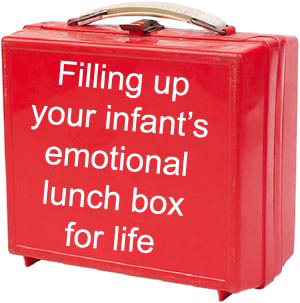 The first year is more psychologically foundational that any
other year AT ALL.
The first year is more psychologically foundational that any
other year AT ALL.
In fact
attachment style research claims
that the first three years of a child's life set more or less
permanent standards for how much your child values himself or
herself, how much he or her trusts the world and how he or she will
learn to cope with challenges.
Striving to always, and as
quickly as possible, meet your baby's physical as well as emotional
needs will create the simple subconscious belief in your child that
the world is good place.
If your baby could speak his or her
feelings, they would probably sound something like this:
- "I can trust people! They will do their best! When I cry I will get help and comfort when I need it. When I am unconditionally met, I can feel that I am loved no matter how I behave! This makes me feel safe and when I feel safe I also feel free to explore and thus develop and learn!"
The seeds of self-esteem (feeling that
you are loved for being who you ARE - not for what you do) are thus
built during the early stages of a child's life.
When your
baby feels safe, secure, and unconditionally loved, he or she will
most likely grow to become a happy toddler that is comfortable,
curious and confident.
And a comfortable, curious and
confident toddler will want to embrace the world as an exciting
place which again will pave the way for strong, secure and
well-balanced adolescence.
And, a strong, secure adolescent
who feels unconditionally loved and empowered from within will most
likely feel less a need to e.g. rebel.
You see, the more
needs that are met (which here may include accepting your child's
need for broader boundaries, self regulation, self authority and
experimentation) the more balanced a person will be.
The
simplicity of this is almost like a mathematical equation! :-)
Embrace Your Child's Uniqueness: Milestones Represent Just Guidelines, not Rules
Outlining baby milestones is meant to
be a helpful guideline, not a rule book.
If all your friends'
babies are rolling over at two months old while your baby is not,
don't worry about it.
If you block away your mental worry and
listen to your gut, most likely it will tell you that nothing is
wrong. You child is merely doing his own course and will achieve
this particular milestone in his own pace.
One of the most
important things to remember about milestones is that your baby
is developing several different skills ALL at the same time BUT at
different speeds.
Just because you can't see a development,
it does not mean that it is not happening.
Most likely you
baby will most quickly develop the skills that either fit his
personality and thus interest him the most or the skills which he
feels he gets most response out of from you.
For instance, my
son's physical baby development was slightly slower than average,
according to the guidelines while his social and communicative
developments were far ahead of time.
His slight physical
slowness was naturally and quickly caught up with after a couple of
months.
While I did wonder a bit, I was never really worried.
I intuitively sensed that there was nothing wrong. And I was right!
Your intuition will always be your most powerful tool! It sure
is mine!
Uplifting, Surprising News:
What May Feel Like Regression Is
Actually Progression
Recognize this or something similar?
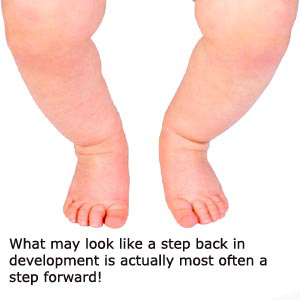 Your infant has finally been
sleeping blissfully though the night for several weeks only to begin
waking up again every three hours.
Your infant has finally been
sleeping blissfully though the night for several weeks only to begin
waking up again every three hours.
Yes, that may feel so
irritating! You had just celebrated your goodbyes to interrupted
nights when they ruthlessly move into your life again.
But
like everything else in life, you can choose which perspective you
want to apply to this situation.
It might feel like a
"regression".
However, child development is not linear.
You may see consistent growth and advancement and then
experience a period when it seems as if your child is "moving
backwards".
As regards the resurrection of waking up at
nights, there could be many, many reasons. It could mean that your
baby is going through a growth spurt and need extra nutrition or
solids.
Or,
perhaps your baby is experiencing what is
popularly called baby separation anxiety, which is actually a sign
that your baby is getting smarter.
Your baby is becoming more
aware and starts to realize:
- "I'm all alone. I don't like that, I feel lost! Not feeling Mom or Dad makes me scared!"
Even though it doesn't seem like it, this is actually "progression"
rather than "regression". Believe it or not, baby separation anxiety
is also a milestone. ;-)
It means your baby is gaining a
better understanding of cognitive concepts and learning to see the
world through more mature eyes.
But like all other phases,
baby separation anxiety will diminish with time and pass at some
point.
Some babies pass through it quickly in a matter of
weeks or months, other babies will wake you up at night the first
couple of, yes ... years (my son did that to me).
The key to
dealing with this literally tiresome phase is not fighting it.
Rather the opposite, in fact. It is full acceptance of that which
IS! Accepting and giving in to your baby's need for security.
Simply meeting the need for security until the need is no longer
there, your presence is no longer required!
Quick Points by Famous Child Development Experts
Urie Bronfenbrenner: EVERYTHING in the Immediate Environment Plays a Role
Your
baby's senses are one of the biggest learning tools during the first
year which help her reach many of her baby milestones.
She
will gain knowledge about her environment based on what she
experiences through sight, sound, taste, smell, and touch.
Urie Bronfenbrenner, founder of the 'Ecological Systems Theory' of
child development, states that everything in a child's environment
will influence how she grows and develops.
That means the
music you play, the tone of voice that you use (even when not
speaking to her), your interaction with family members, the attitude
of the people around her, the way you touch her and the amount of
time spent with her are all factors that will impact how she sees
herself and the world around her.
Jean Piaget: Understanding the World Through the SENSES
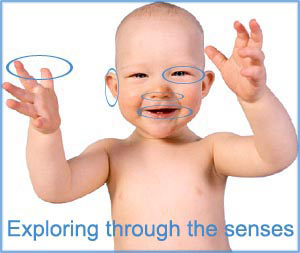 Jean Piaget was one of the first ones to
stress the fact that infants see the world differently than adults.
Yes, today we think it is obvious - but at his time, his thinking
was revolutionary.
Jean Piaget was one of the first ones to
stress the fact that infants see the world differently than adults.
Yes, today we think it is obvious - but at his time, his thinking
was revolutionary.
Jean Piaget calls his first level of
development the Sensori-motor stage (0-2 years).
It is during
the Sensori-motor stage that infants and toddlers try to make sense
of the world around them and thereby reach many cognitive baby
milestones.
They learn how to take information received
through sensory stimulation and process it – or organize it – in a
way that can be useful to them. They learn to understand their
bodies and how to control their movements.
This is also the
stage when language and thinking begins.
According to Piaget,
parents can encourage development by providing lots of opportunities
for their babies to interact with their environments so they can use
their senses to constantly gain new information.
Erik Erikson: The Crucial Establishment of TRUST
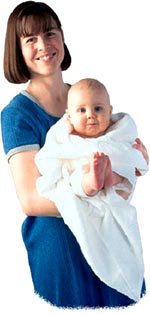 In Erik Erikson's
theory, this first year is defined by what he calls a trust versus
mistrust stage.
In Erik Erikson's
theory, this first year is defined by what he calls a trust versus
mistrust stage.
Babies who have their physical and emotional
needs met will develop basic trust toward those close to them.
Basic trust or secure attachment has been scientifically proved
to pave the way for a happy, confident baby who is not afraid to
explore the world and learn new things.
In this way secure
attachment leaves space for exploring which again paves the way for
reaching many exciting infant milestones.
What ALL Experts
Agree on:
'Meet Your Baby's Needs!'
No matter which theorist
you read, they all agree that meeting your baby's needs is crucial
to healthy development during the first year.
To 'measure'
successful development (if that is possible!), doctors will usually
look at infant milestones in three areas: physical, cognitive /
psychological, social / emotional.
Since so many
milestones are reached during the first year, each month will be
divided into several segments.
Remember, this is just a
general guideline. You child is unique!
However, if you do
have any concerns and your gut feeling tells you something is not
right - it is always a good idea to make an appointment with your
doctor or pediatrician to rule out any medical conditions or
developmental delays.
1st and 2nd Month of Baby Development
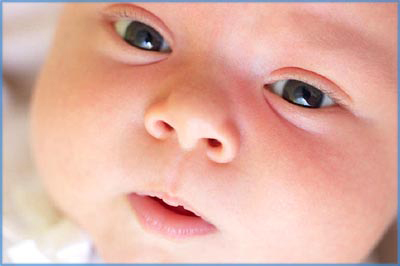
Physical Milestones of the 1st and 2nd Month
First Month
- Early head and eye movement: By the end of
the first month, your baby may be able to lift his head briefly
while lying on his tummy, turn his head from side to side while
lying on his back, and follow moving objects with his eyes.
- Stretching the body: Much of his movement is a result of inherent
reflexes that will slowly decrease over the next couple months.
Your infant will spend much of his time curled up with his legs pulled into his abdomen and his fists clenched. This is because your baby is used to the confined quarters of the womb, but he will begin to stretch out in the coming weeks. - Communication: Your
baby will recognize your scent and the sound of your voice, and will
communicate his needs to you mostly by crying.
- First Mimicking: By the end of the fourth week, your baby may begin to
mimic your mouth movements and start to make gurgling or throaty
sounds in an attempt to initiate conversation.
- Visual focusing: Your baby's vision is still quite blurred, although he
will focus on objects that are close, and he will love to stare
intently at human faces, especially when they are speaking to him.
Like the first month, the second month of your newborn's life is filled with rapid growth and change and many milestones are reached:-)
Second month
- From inborn reflexes to more
controlled movements: Thanks to your newborn's many reflexes, her
muscles are now much stronger and her movements will become
increasingly more controlled and intentional.
Many of these newborn reflexes will decrease throughout the second month and you will notice improved coordination.
The early jerky motions will become more fluid and your baby may be able to raise her head to an angle of 45 degrees while lying on her tummy.
Due to increased neck and back strength, she will be able will begin stretching out to explore her larger environment. - Awake for
longer periods of time: Your baby will be alert for longer periods,
and when she is awake, she will spend this time kicking her legs and
punching her fists or flailing her arms. This is her way of
exercising, which will help strengthen her body even more.
- Early interest in objects: Your infant will become very excited when
you shake a rattle or show her a colorful picture book. When you put
your baby under a baby gym, she may attempt to swipe at the toys or
try to grasp the objects.
Don't worry if she is rarely successful, as her coordination and her ability to judge distance is not very developed at this stage. She will improve with practice and maturity. - Binocular vision: Your baby's vision will
continue to improve, and by the end of the second month she will
likely have developed binocular vision, the ability to focus both
eyes on the same point at the same time. She will notice more facial
details and will be able to see things that are farther away.
You may also notice that your infant will follow you with her eyes as you move around a room.
Cognitive and Psychological Milestones of the 1st and 2nd Month
- Recognizing you: During your baby's second month, she will be able to
recognize you when she sees you. She may even begin to wiggle her
little body or kick her legs and wave her arms in excitement when
you enter a room.
Your baby's memory will continue to improve and she may begin to respond to familiar people and objects.
- Responding with sounds: You baby's vocal sounds will continue to
become more sophisticated and she will become more adept at
recognizing the elements of language and conversation, maybe even
making gurgling or cooing sounds in response to you interacting with
her.
- Bobbing her head: If held in a sitting position, your
infant may bob her head. This is both a form of communication as
well as a way of helping her gain an understanding of her body and
learning to balance, which will be helpful in the next few months
when she tries to sit on her own.
Social and Emotional Milestones of the 1st and 2nd Month
Although your baby will still cry quite a bit, he will also begin using other methods of communicating with you. These are the first signs of more conscious communicative infant milestones:
- More conscious
communication: Now your infant has more control over his body, he
may use his hands, feet, or even facial expressions to get your
attention and relay his needs.
- First real smile: At about
six weeks your baby will reward you with genuine smiles and will
become more skilled at imitating other facial gestures.
As he begins to relate certain actions with specific responses, he is learning the foundations for social interaction that will help him build social skills in the future.
3rd Month of Baby Development
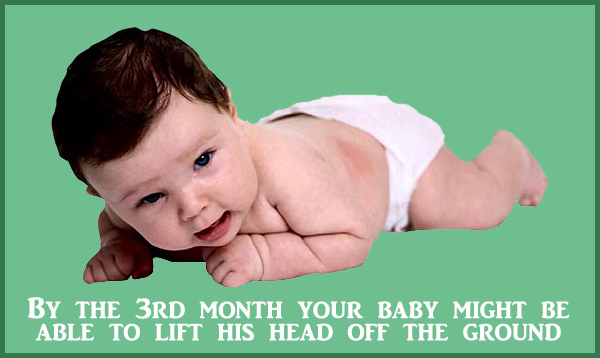
Physical Milestones of the 3rd Month
- Stronger head movements: Your
baby is becoming stronger and will likely be able to lift his head
off the ground when lying on his back. When on his stomach, he will
be able to raise his head and shoulders between 45 and 90 degrees
while supporting his weight on his forearms.
You may even notice that he begins to turn his head to look around when he is in this position.
If you sit him on your lap or place him in a baby bouncer, he may be able to hold his head steady, although he may still bob forward when this position becomes too tiring.
- Push off with his feet: If you hold your baby in a standing
position, he will straighten his legs and push with his feet to
begin bearing his body weight.
- Playing with her hands: During this month, your little one will make a remarkable discovery
– her hands! They will become a great source of fascination and she
will spend a lot of time looking at them, clasping them together,
and even repeating clapping motions.
She will love to play with her fingers and will be able to control her movements enough that she can bring her hands to her mouth to suck on them.
- Holding objects: At this stage, your baby will be able to hold
objects in her hands and you may notice her pulling on her clothes
or grasping nearby objects.
- More detailed vision: She will
be able to follow objects within a broader range and improved focus
will allow her to notice more detail as well as color and lighting
changes.
Cognitive and Psychological Milestones of the 3rd Month
- Conscious movements: During this month, your
baby will likely reach one of the significant baby milestones – the
realization that he can control his motions and make his body move
by himself. This is important because it lays the foundation for the
understanding of cause and effect and helps your baby realize that
he can make choices.
Also, seeing an object and deciding to reach for it is crucial for the development of hand-eye coordination. - Enlarged sound vocabulary: Your baby's
language will become more sophisticated, with squeals, babbles, and
coos.
And, he will direct more of his sounds toward you when you talk to him, as if attempting to have a conversation with you.
He will begin to enjoy the sound of his own voice and will play with his tongue and move his mouth in interesting motions to experiment with different sounds. - Different sounds for
different things: Your baby's ability to communicate has improved
greatly from birth and he will begin to realize that certain sounds
or noises will bring particular results.
You may notice that specific vocalization is associated with activities, such as cooing when he wants music or grunting when he wants to eat. - Memory expansion: During this stage of development, you infant will
show recognition of faces, voices, and objects, and will respond to
people and things that are familiar.
As his memory improves, he will even remember how to do certain things such as hitting a toy on a play gym or shaking a rattle, even if the object is taken away for a few days at a time.
Social and Emotional Milestones of the 3rd Month
- Early understanding of cause
and effect: Since she is beginning to understand the concept of
cause and effect, she will develop an understanding that certain
behavior will bring specific results.
For example, she will learn that smiling will encourage cuddling or playing.
She will respond more to your moods and will smile more when you smile back. - Locating sounds: Your baby's hearing has developed
enough that she will be able to locate sound and turn her head
toward it, allowing her to "participate" and interact in more family
activities.
- First signs of baby separation anxiety: She
will also begin to react to strange situations and may more actively
seek out the security of your presence.
4th Month of Baby Development
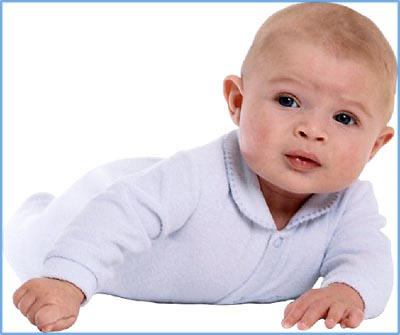
Physical Milestones of the 4th Month
During this month, your infant will reach many milestones regarding coordination as he will start to have more control over his movements.
- Holding raised head position:
He may be able to raise his head and chest off the floor when lying
on his stomach and hold this position for a while.
- Rolling
from back to side: He may begin to roll from his back to his side
and will be able to grab hold of a toy that you give him, although
it may often take more than one attempt as his hand-eye coordination
is still developing.
- Sitting with support: He will have
good head control and will be proud that he can sit – with a little
support from you, of course.
- Still lots of hand playing:
His hands are still one of his favorite toys and he will continue
having fun discovering what they can do.
- Long distance sight: He is now quite adept at focusing both eyes together and will
be able to see things across a room.
Cognitive and Psychological Milestones of the 4th Month
- Signs of
curiosity: Your infant will begin to develop signs of curiosity and
will enjoy sitting on your lap or in a bouncer so that he can look
around and be part of everyday activity.
-
Signs of object
permanence: He will have the ability to follow a moving object, and
when the object disappears from sight, he will continue looking
where he last saw it. This is an important prerequisite for object
permanence and is a significant infant milestone.
- Consonant
sounds: His variety of sounds will expand throughout this month and
he will begin to experiment with consonant sounds.
- Starting
communication: He may also begin initiating conversation by being
the first one to make noise when you walk into a room.
If you respond to this initiative, you will give him confidence to continue developing more language skills. - Expectations of the
future: This is also a good stage to begin establishing a routine
because your baby has now developed the ability to recognize
patterns.
Knowing what to expect will make him feel safe and secure. - Improved understanding of cause and effect: You may
also notice that your baby has a greater understanding of cause and
effect. For example, he may now remember that shaking a rattle will
bring a noise or kicking at a mobile will cause it to move.
Social and Emotional Milestones of the 4th Month
- Laughing: Your baby may now laugh out loud, showing that he
understands the difference between a positive and negative
situation.
- Understanding the shifting turns of
conversation: He is also beginning to develop a greater
understanding of conversation, realizing that when he talks, you
talk back.
5th Month of Baby Development
Physical Milestones of the 5th Month
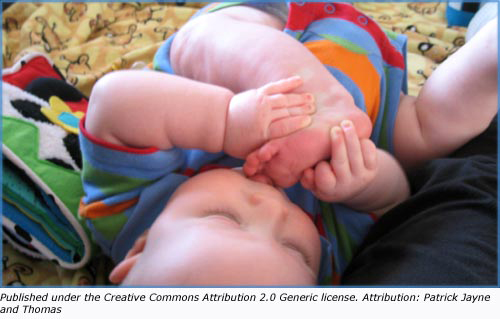
- Playing
with feet: During this month, your baby will make yet another
exciting discovery – her feet! When lying on her back she will pull
her feet to her mouth or play with her toes.
It is fun to watch her fascination as her hands and feet interact with each other. - Reaching out for objects: She is now very adept at
reaching for and grabbing objects that she desires, and will usually
put everything she holds into her mouth.
- Holding head steady: She is now able to hold her head steady when supported in a
sitting or standing position and will begin to push with her legs
and feet to prepare her muscles for crawling.
- Bouncing up
and down: If you hold her upright, she may bounce up and down,
although her legs might tire quickly (or not - my son did this
practically all the time) and she will want to sit down.
- Rolling from stomach to back: Another significant milestone will be
reached this month – your baby may learn to roll from her stomach to
her back.
- Perhaps signs of the first tooth: Increased
drooling and chewing on fingers is a sign that teething might be
beginning. Keep your eyes open for that first tooth to appear!
Cognitive and Psychological Milestones of the 5th Month
- More control of sounds of communication: From a very early
age, your baby was able to recognize the various tones and rhythms
of your voice, but during this month, he will be able to change his
own pitch and inflection to communicate with you.
He may be able to use combinations of sounds when "talking" to you and his "conversations" will be longer and more complex.
- Better
short term memory: She will begin to lose the "out of sight, out of
mind" concept and may cry or show displeasure when you take a toy
away or remove her from an activity that she is enjoying.
- Focusing attention for longer: Both her concentration and memory
will improve greatly throughout this month and she will continue to
learn and advance because of her increased ability to focus on tasks
for longer periods of time.
Social and Emotional Milestones of the 5th Month
Your baby will want to be part of everything that is going on. She will enjoy interacting with others and will actively contribute to conversations.
- More complex
communication: She will use more facial gestures to express her
mood, will raise her arms to be picked up, and will concentrate
carefully when you show her how to use a toy.
- Mirror
communication: If you put her in front of a mirror, she will smile
at her image and even try to communicate with herself.
This is a very important time in the social development of your child. If you encourage her to participate and make her feel secure in her social interactions, she will be better equipped to respond to the feelings and emotions of others as she grows.
6th Month of Baby Development
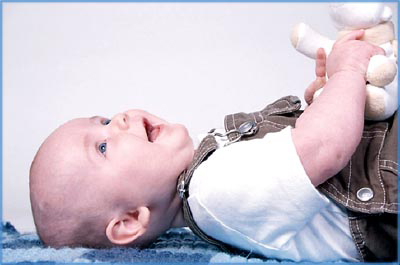
Physical Milestones of the 6th Month
This is an exciting month of baby milestones, so be prepared because you don't want to miss anything.
- Perhaps sitting: Sometime during this period, your baby may
begin rolling from his back to his tummy and he may even learn to
sit on his own!
- Passing objects from one hand to the other:
Not only can he grasp objects, but he may now be able to pass them
from one hand to the other. You might also notice that he turns his
wrist or moves his arm position to examine a toy from every angle.
- Perhaps holding his bottle: He will be proud of himself
because perhaps he can hold his own bottle, although he will still
enjoy being held and cuddled when feeding.
- More advanced
head movement: As your infant gains more control of his body, he
will be able to turn his head from side to side, move it up and
down, and even reposition himself to see an object or person within
the room.
- Supporting most of his own weight: His legs are
becoming stronger, and he will now be able to bear most of his own
weight when standing, although he will still need your support for
balance and security.
- Lots of chewing on things: By this
stage, his hand-eye coordination is almost fully developed and he
will be able to reach for an object and bring it to his mouth with
great accuracy.
This may be a good time to give him a teething ring or toy, as he will love to chew and bite. - Perhaps the first tooth: Stay alert – sometime during this month a
tooth or two may appear.
Cognitive and Psychological Milestones of the 6th Month
- Decoding moods via expressions: Your baby will be even more skilled at reading facial expressions
and will be able to tell the difference between a happy, sad, or
angry face.
- Sharper concentration: His focus will be
greatly improved and he will be able to concentrate on one thing at
a time, such as a toy or picture book.
While his attention span is much longer, he will still become distracted after short periods of time and will move on to another activity. - Craving stimuli: A variety of stimulation is how he will learn, so
he will enjoy experiencing a lot of different sights, sounds, and
textures. He will be interested in more complex stimuli and prefer
activities that engage all of his senses.
- Tongue exercises: Language development may reach new
dimensions during this
month. You may notice that your baby is experimenting with his
tongue – sticking it out, moving it around, and using it to form a
variety of sounds.
Blowing raspberries is also common as your little one becomes more adept at manipulating his lips and mouth.
- The first sounds of words: You may notice that he becomes even
more skilled at changing the tone of his voice and will use distinct
sounds to communicate specific needs and feelings. He may even start
forming one syllable words such as "ma" or "da".
- Understanding some of what you say: He has now had enough experience
associating sounds with facial expressions that he may be able
understand a little bit of what you are saying, and you may notice
that he responds to his own name.
When this happens, you know that he has reached a very significant cognitive milestone and has moved to the next step in identity formation.
Social and Emotional Milestones of the 6th Month
- Recognizing
parents: By this sixth month, your baby will most surely be able to
recognize her parents as well as those close to her. She will also
be able to tell the difference between strangers and familiar faces.
- More sophisticated showing of emotions: She may also learn to
express her emotions more appropriately. For example, she may bounce
with excitement when she is happy, pout when she is sad, or screech
and flail her arms when she is frustrated.
7th and 8th Month of Baby Development
Physical Milestones of the 7th and 8th Month
-
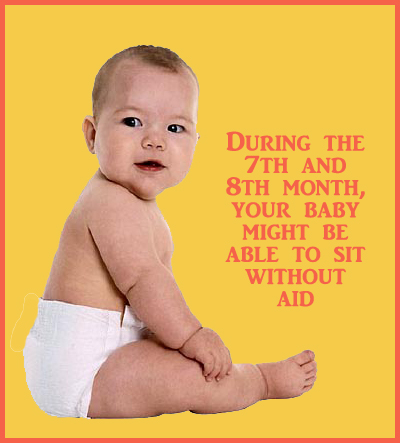 Sitting without aid: During this
period, your baby will be able to sit on her own with confidence. As
balance improves, she will begin to lean forward and use her hands
to play with toys while in a sitting position.
Sitting without aid: During this
period, your baby will be able to sit on her own with confidence. As
balance improves, she will begin to lean forward and use her hands
to play with toys while in a sitting position.
She will be able to adjust her posture to reach for an object without falling over. - Full support of her own weight: Her legs will now be
able to bear her full weight and sometime during these months she
will begin supporting herself in a standing position while holding
onto your hand or a piece of furniture.
- Early crawling
attempts: She may be able to scoot herself forwards or sideways when
lying on her tummy and may also begin to pull herself up onto her
hands and knees and rock back and forth while in this position.
Some babies are even crawling by the eighth month, although many do not achieve this milestone until they are nine or ten months old. And, do not be surprised if your little one begins crawling backwards or sideways before learning how to move forward. This is quite normal.
She may even travel around on one knee or drag herself across the floor on her tummy, using her arms to propel herself forward.
Experimenting with different methods is good for developing problem solving skills and also helps strengthen a variety of muscles. It is really about transportation, not style or form :-)
Being able to move around on her own means that she can explore her world and can come find you rather than waiting for you to come to her. - More hand and finger dexterity: She can
now hold objects securely in both hands and bang toys together or
pound them on surfaces.
She will begin using her thumb and three fingers to pick up objects rather than using her whole hand as a "scoop", and will be able to put toys down and pick them up again at will.
Sometime during these months she may also begin using her index finger to point, rather than her whole arm or hand.
Cognitive and Psychological Milestones of the 7th and 8th Month
- Attaching names to people: Your baby will now
consistently respond to her name and may also recognize the name of
other family members. If asked, "Where is mommy?" she will turn and
look in the direction of her mommy.
- Understanding more than
she can express: She will listen intently when spoken to and will
respond when she hears familiar words.
Remember, babies understand a lot more of the language than they are able to vocalize. So, just because she cannot use words to communicate with you, it does not mean that she doesn't understand what is being said.
For example, if you ask her, "Do you want milk?" she may show her understanding by either smiling or bouncing for a positive response or turning away for a negative response.
However, she will not be able to request milk, and may still depend on other forms of communication to get your attention and express this desire.
One of the best ways to help her develop language skills is to talk to her, especially about those things that she can see, hear, touch, smell, or taste.
"Talking directly to your child and holding his attention as you speak also helps him develop his imitative abilities and his language skills. This kind of human interactive language is the only effective way of learning language; passive listening to radio or TV does not help to develop the neural networks that are essential to language development" (Growing With Your Child, 1998, page 156).
- Two
Syllable Words: During these months, your baby will reach many
linguistic baby milestones and "talk" more, especially when others
are talking, and she will begin forming simple two syllable words
such as "mama", "dada", or "bye-bye", although these words may not
have any meaning to her.
She is simply experimenting with language and learning how to put sounds together.
Social and Emotional Milestones of the 7th and 8th Month
- Communicating with eye movements: Your baby will learn to use her
eyes to communicate with you. For example, she may look at you, then
a toy, then back at you again.
- More control of social
situations: Now that she can move around on her own, she will put
herself into social situations, and remove herself when she wants to
be alone.
- Signs of jealousy: She may also begin to express
displeasure when another child is using a toy that she wants, and
may show jealousy if you are holding another baby.
9th, 10th, 11th and 12th Month of Baby Development
Physical Milestones of the 9th, 10th, 11th and 12th Month
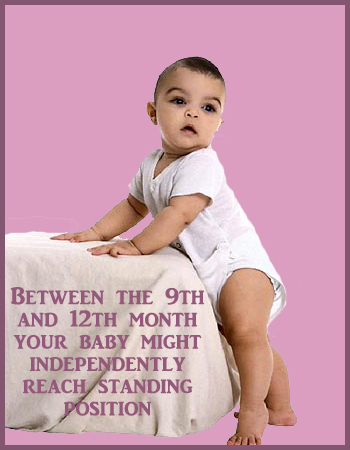 During this period of
early child development, your baby will experience a lot of growth
and advancements, although when each of the milestones are reached
will depend on the individual child.
During this period of
early child development, your baby will experience a lot of growth
and advancements, although when each of the milestones are reached
will depend on the individual child.
- Independently reaching
standing position: At some point during these months, your baby will
be able to move from his stomach to a sitting position, and will
begin using furniture to pull himself into a standing position.
At first, he will not know how to sit back down and will probably take many falls.
But, by about 10 months old, he will have mastered the ability to lower himself back to the floor on his own. - Assisted walking: Before long, he will begin
lifting one foot and then travelling around the furniture.
Once he gains confidence, you will notice that he may use only one hand for support, and will often let go with both hands and stand on his own for a few seconds at a time.
It is important that you encourage your child, but not rush him to begin walking. This ability requires self-confidence as well as sufficient muscle strength and balance. - First unassisted steps: At about
twelve months, your little one may attempt his first steps, although
some babies will walk as early as nine months while others will not
achieve this ability until well past their first birthday.
- Finer motor control: Sometime during this period, he will gain the
ability to pick up small objects using his thumb and index finger
and may begin showing a preference for one hand.
He will be able to put objects into a container and then remove them again, and he will also be able to retrieve objects that are behind him while in a sitting position.
He will be able to sit down and stand up on his own, turn pages in a book, or roll a ball if asked.
He will have enough coordination to build a tower using blocks, pull a toy on a string, and even begin coloring with a fat crayon.
Cognitive and Psychological Milestones of the 9th, 10th, 11th and 12th Month
More exciting linguistic baby milestones are reached by the end of the first year:
- Attaching words to objects: As you talk to him, your baby will begin
to associate certain words with particular objects.
He may also be able to responds to simple verbal commands and will understand the word "yes".
When asked a question, he will likely use body language to answer, such as nodding his head, waving his hands, or smiling. - Understanding abstract concepts: He may also be able to wave goodbye with understanding, and will begin
to grasp the concepts of "in and out" or "up and down".
If you ask him, "Where are the stars?" he will look up. Or, if you ask, "What does a cat say?", he will attempt to meow.
- A vocabulary of a few words: By ten months, he will usually have a few
words in his vocabulary and be able to use them with meaning.
For example, he may be able to identify his parents using the words "mama" or "dada", or he may be able to answer a question with the word "no".
By the end of the first year, most children will have approximately 10 words in their vocabulary, although it is not uncommon for a child to be using only one or two words at this stage. - Mastering object permanence: Until this point, if
you hid a toy or took it away, your baby would quickly forget about
it.
But now another one of the cognitive milestones are firmly reached. At about 10 months of age, he will now begin looking for the missing toy. He is beginning to understand that just because something is out of sight does not mean that it no longer exists.
He will often search for an object in the place where he last saw it, or where it typically belongs.
Engaging your baby in games of peek-a-boo will help develop this particular example of baby milestones.
Social and Emotional Milestones of the 9th, 10th, 11th and 12th Month
- Perhaps strong
separation anxiety: During this period, your child may experience
separation anxiety.
He may panic when you are out of sight, be fearful of strangers, and cling to you in uncomfortable or unfamiliar situations. This is the time when he needs extra reassurance and dependability so he with time will overcome his fear and insecurity.
This fear may also cause difficulty sleeping, and you may notice that normal things are suddenly causing anxiety, such as the telephone ringing or the toilet flushing.
Your baby may even revert back to a "younger" stage when things felt safer. For example, he may begin crawling again instead of walking, or he may want to sleep with you rather than in his own bed.
Remember, this is just another stage of baby development, and lots of encouragement and love will help him cope better through this challenging time. - Playing interactive games: Your baby will
embrace his new found independence when in familiar surroundings,
although he will still want you to stay close-by.
He will love to play interactive games such as pat-a-cake or finger puppets, and he will really enjoy being read to while he follows the pictures.
His understanding of the language is quite comprehensive at this point so he will love to play games using words he recognizes such as "ball", "book", or "duck".
- Clearer communication: He will shake his head saying "no", he will
push away something that he does not want, he will show frustration
when his independence is limited, and he will begin giving hugs and
kisses to show affection.
The first year of your baby's life is filled with lots of baby milestones in terms of growth and development.
By your child's first birthday, you will be able to celebrate a job well done, and look forward to all the milestones that are yet to come.
Your Positive Parenting Ally,
Birgitte

Want to stay in touch and get the latest news?
Sign up
for my free newsletter
Parent Coaching
- For Inner Peace, Clarity and a Deeper Connection to Your Child
 Being a parent can feel like a double-edged sword. Life with kids may feel like the greatest gift you have ever received, while at the same being hugely challenging, often leaving you confused, stressed and overwhelmed.
Being a parent can feel like a double-edged sword. Life with kids may feel like the greatest gift you have ever received, while at the same being hugely challenging, often leaving you confused, stressed and overwhelmed.
When we feel like this, we've lost touch with ourselves. We can't hear our own inner voice, and it's difficult to know what is 'right' for us and how to act.
I offer in-depth parent coaching to help you regain your balance and get back in touch with yourself. From a place of inner peace and clarity, your will find your own answers which will help you reconnect with your child from a place of unconditional love and acceptance.
Read more about my parent coaching here.
Where Would You Like to Go Next?
Age Specific Child Development Articles
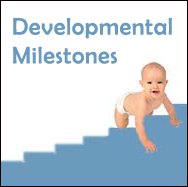 The Most Significant Developmental Milestones: Understand Your Child all the Way through the 6 Stages of Child Development. |
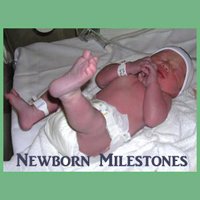 A Newborn Development Guide About the First Physical, Psychological and Social Infant Milestones and How to Handle Them! |
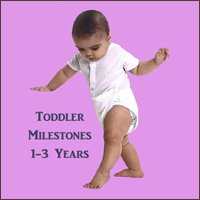 Inspiring Toddler Development Guide: A Long List of Toddler Milestones and Positive Parenting Tips for Parenting Toddlers. |
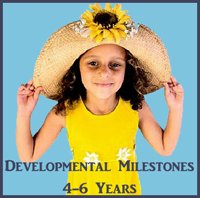 A Guide to the Early Child Development Stages and a List of Child Development Milestones from 4-6 Years. |
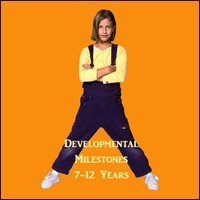 Stages of Child Development from 7-12 Years: A list of Physical, Cognitive and Social Developmental Milestones. |
 Teen Development and Adolescent Development: Physical, Cognitive and Social Developmental Milestones. |
Other Child Development Articles
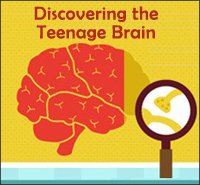 Judgment Call: Understanding the Teenage Brain. |
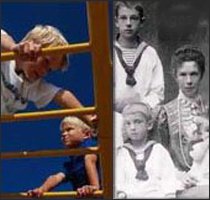 A Fascinating Journey into the Psychology of Children: From the Grand Masters' Fixation with Development Stages to the Context Focus of Today! |
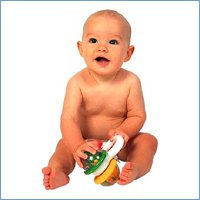 Jean Piaget's Object Permanence Developmental Stages: Theoretical Outline, Modern Critique and Parental Advice! |
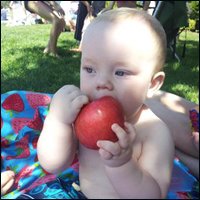 Keeping Track of Child Development Milestones: Spot Deviations like Early ADHD or Autism Symptoms. |
Back to the top of this page about In-Depth List of All the Baby Milestones Reached the First Year: Exciting Insights into Physical, Psychological and Social Baby Development
Go to the Positive Parenting Ally Homepage







